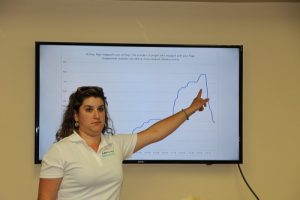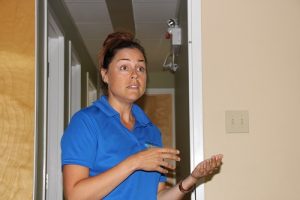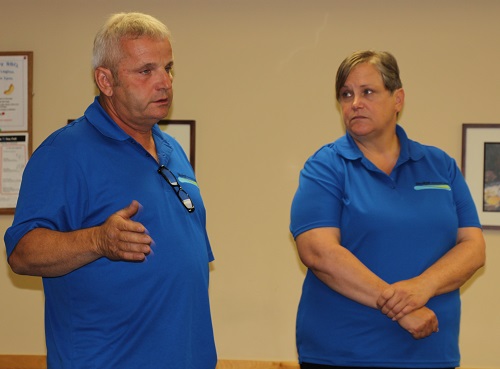

WHITEWATER REGION (Cobden) — Whitewater Region Mayor Hal Johnson is pleased with how much the Muskrat Watershed Council has done for the watershed in the past four years.
While there have been a few groups that have popped up over the years regarding the lake, this group has proven its dedication to improving the water quality, he said at the organization’s annual general meeting last Thursday evening.
“The difference between 2018 with this council, and 2014, how far you have moved forward, is just amazing,” he said.
“We have supported from council this group 100 percent because this group proved to be very good at what it’s doing and that’s moving forward,” the mayor continued.
“Volunteer work is key in our municipality.”
The leadership is good, he added.
Karen Coulas, co-chair with her husband Rene, thanked everyone for attending the meeting.
“I know there are 101 better things you could be doing, so is your commitment to water quality,” she said.
She quoted from Jacques Cousteau, “as a country, and around the world, we forget that the water cycle and the life cycle are one in the same and we can’t have one without the other.”
It’s important we protect our water, she said. The annual general meeting provides an opportunity for those interested in the watershed and Muskrat Lake to interact with each other, get valuable information, find out what the MWC is up to and the MWC can find out what the people want, she continued.
She encouraged people to purchase a membership and/or become a volunteer with the MWC.
“People all have skillsets we can use,” Ms. Coulas said.
The MWC has been busy with a variety of things this past year, including educational outreach, speaking to Virgin Lake property owners on what they can do for their properties and work with their shorelines; partnered with the Bonnechere River Watershed Project, which is working with the Freshwater Partners of Renfrew County, and is funded by the Trillium Foundation.
Ms. Coulas noted there are openings for volunteers with the MWC, including representatives for the anglers and hunters, property owners, agency liaison, business development and fundraising.
Julie Sylvestre spoke about the second draft report prepared by Dr. Rebecca Dalton.
“This is a draft report, but the recommendations provided are similar to the first report,” she said.
It’s the same work, same problems, she added.
Ms. Sylvestre noted the original report was funded by the Cobden Civitan Club while the second report was courtesy of JP2G Consultants.
She’s hopeful that once the actual documents have been received, and not just in draft form, Dr. Dalton will attend a meeting to give a talk on the report.
When the report is available, it will be posted on the website, said Dave Thomassin, science committee chair.
There are several recommendations, including to continue monitoring the 22 sites, most of them in Admaston/Bromley Township, Ms. Sylvestre said. Most of the sampling is being taken from above the lake because that is what is coming into Muskrat Lake, she explained.
It was suggested the samples should be taken monthly throughout May and September.
Weather patterns are changing, and has an impact on the results, she said. Other recommendations include putting in buffer strips along farm fields and installing controlled tile drains in other fields, because these have proven to benefit water quality in other watersheds, Ms. Sylvestre said.
Considerations for improving water quality in the watershed included evaluating data from the Mink Creek and Stoquoa Creek controlled tile drain structures; measuring discharge so that estimates of nutrient loading can be calculated and continue to educate and engage the public with simple and clear messaging, she noted.
The partnership with Algonquin College included shoreline restoration on Muskrat Lake in partnership with Natura Edge; Love Your Lake program and planting shrubs and trees on properties.
Andy Laird spoke about the aeration system at Cobden Beach. Joking around, he said when people ask what the bubbling is going on at the lake, he tells them Mussie is working.
The aeration system is six aerator pads that are 16” squares powered by a compressor. The system provides a constant air source that encourages water movement, he explained. The MWC worked with the Ministry of Environment for two years to get the aeration system approved and installed, he said.
The system was installed last fall, shut off for the winter, and started back up in the spring, Mr. Laird said. It’s not expected there will be any definite change in the beach area for two to three years.
It’s hopeful the biological enzymes being added will clear out the weeds and improve the beach area, he said.
To pay for the $32,000 project, the MWC received a loan from Whitewater Region, which has been paid back in full, fundraising and a grant, he said.
Mr. Laird noted this system cannot be used for the whole lake, but any bay areas could be done.
Ms. Coulas noted that while there hasn’t been any significant change in the beach area, the beach was open this year until recently, while last year, it wasn’t open at all for swimming.
Mr. Thomassin spoke about the Love Your Lake program, which provided each property owner with a survey to fill out regarding their own property. Once they were completed and returned, each property owner should have been provided with a profile of what they can do to help Muskrat Lake, he said.
As for the controlled tile drains, Ms. Sylvestre said each of the farmers will take them over after two years.
“We’re hoping farmers will continue to do the controlled tile drains on their own,” she said.
Mr. Thomassin noted over three years, the MWC will plant 45,000 trees, but help is needed to do this. He noted this volunteer work can be used for high school students’ community hours. Planting is expected to happen this October.
Updates were also provided by the fundraising committee and communications and media.
Megan Rae, who recently took over the communications and media portfolio, used graphs to demonstrate how social media is a useful tool in reaching the public. She showed one graph where there was a big dip in the number of people who visited the facebook page, and she noted she was away on vacation during that time.
The website and facebook page have been updated and Ms. Rae said people are interested, they want to know what’s going on.
She noted there is various information on the website that people are interested in, including beach closures and where algae blooms are.
“The public wants to know what’s going on,” Ms. Rae said.
There have also been various publications created by MWC, including newsletters, and a booklet titled What You can do for Muskrat Lake, which has specific information for property owners and farmers.
Following the acclamation of officers – since there were no nominations – Ms. Coulas thanked everyone for coming out. The officers are: Karen Coulas, chair, Rene Coulas, vice-chair, Erin Dolan, secretary, Debbie Macdonald, Treasurer plus various directors and representatives.
She noted the MWC meets the third Thursday of each month, 6:30 p.m., in the community hall at the municipal office in Cobden. Anyone can attend a meeting, she added.
“Thank you for coming out and helping us work towards our goal,” she said.
Closing, Ms. Coulas said there are hundreds of little things people can do to help water quality wherever they live, including washing your car on the grass so the soap and conditioners are filtered before going into the water.
For more information, visit www.muskratwatershedcouncil.com or the facebook page, Muskrat Watershed Council – MWC.







![Kenopic/Smith Auction [Paid Ad]](https://whitewaternews.ca/wp-content/uploads/2018/10/advertising-100x75.jpeg)

